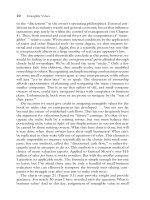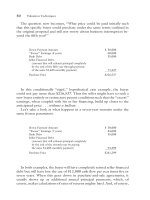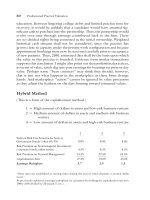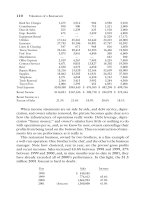Basic concepts for capacity building WHO
Bạn đang xem bản rút gọn của tài liệu. Xem và tải ngay bản đầy đủ của tài liệu tại đây (17.68 MB, 76 trang )
Research ethics committees
Basic concepts
for capacity-building
Ethics_basic_concepts_ENG_05-01.indd 1
8.5.2009 17:57:58
Ethics_basic_concepts_ENG_05-01.indd 2
8.5.2009 17:57:58
Research ethics committees
Basic concepts
for capacity-building
Ethics_basic_concepts_ENG_05-01.indd 1
8.5.2009 17:57:58
www.who.int/ethics/publications/en/
WHO Library Cataloguing-in-Publication Data
Research ethics committees : basic concepts for capacity-building.
1. Ethics, Research - education. 2. Ethics committees, Research - organization and administration.
3. Research support as topic. 4. Manuals. I. World Health Organization.
ISBN 978 92 4 159800 2
(NLM classification : W 20.5)
© World Health Organization 2009
All rights reserved. Publications of the World Health Organization can be obtained from WHO
Press, World Health Organization, 20 Avenue Appia, 1211 Geneva 27, Switzerland (tel. : +41 22
791 3264 ; fax : +41 22 791 4857 ; e-mail : ). Requests for permission to
reproduce or translate WHO publications – whether for sale or for noncommercial distribution
– should be addressed to WHO Press, at the above address (fax : +41 22 791 4806 ; e-mail :
).
The designations employed and the presentation of the material in this publication do not
imply the expression of any opinion whatsoever on the part of the World Health Organization
concerning the legal status of any country, territory, city or area or of its authorities, or
concerning the delimitation of its frontiers or boundaries. Dotted lines on maps represent
approximate border lines for which there may not yet be full agreement.
The mention of specific companies or of certain manufacturers’ products does not imply
that they are endorsed or recommended by the World Health Organization in preference to
others of a similar nature that are not mentioned. Errors and omissions excepted, the names
of proprietary products are distinguished by initial capital letters.
All reasonable precautions have been taken by the World Health Organization to verify
the information contained in this publication. However, the published material is being
distributed without warranty of any kind, either expressed or implied. The responsibility
for the interpretation and use of the material lies with the reader. In no event shall the World
Health Organization be liable for damages arising from its use.
Photo credits : WHO : cover, p.18, p.24 – WHO/H. Anenden : p.8 – WHO/Christopher Black :
p.10, p.42, p.62 – WHO/J.Mohr : p.28 – WHO/Marko Kokic : p.36 – WHO/EURO : p.50
Design : www.sbgraphic.ch
Printed by the WHO Document Production Services, Geneva, Switzerland.
Ethics_basic_concepts_ENG_05-01.indd 2
8.5.2009 17:57:58
Contents
Acknowledgements ................................................................................................................... 4
Glossary ............................................................................................................................................. 5
Introduction ..................................................................................................................................... 9
Research ethics committees ............................................................................................ 11
Ethical analysis .......................................................................................................................... 19
Organizing a training programme .............................................................................. 25
Evaluation of risks and benefits ................................................................................... 29
Confidentiality ............................................................................................................................ 37
Informed-consent process ................................................................................................ 43
Annex 1
Financial conflicts of interest in medical research ......................................... 51
Annex 2
Guidelines and regulations ............................................................................................... 63
3
Ethics_basic_concepts_ENG_05-01.indd 3
8.5.2009 17:57:58
Acknowledgements
This document was prepared by Carl Coleman, Trudo Lemmens, Tarun
Mehra and Aissatou Toure, under the coordination of Marie-Charlotte
Bouësseau, Ethics and Health Unit, Department of Ethics, Equity, Trade
and Human Rights, WHO. We gratefully acknowledge the technical
and financial assistance of the PATH Malaria Vaccine Initiative and
the inputs of Mylène Botbol Baum, Marc Guerrier, Reva Gutnick and
Laurence Lwoff.
4
Ethics_basic_concepts_ENG_05-01.indd 4
8.5.2009 17:57:59
Glossary
Assent :
A variation on consent where a person who does not possess full competence to give informed consent gives affirmative agreement to participate in research. For instance, a child or person with dementia should
give assent before being enrolled in research. However, it is important
to note that assent does not eliminate the need for obtaining the permission of a parent or other legally authorized decision-maker.
Bioethics :
A field of ethical enquiry that examines ethical issues and dilemmas
arising from health, health care and research involving humans.
Competence :
Refers to a potential or enrolled participant’s mental capacity to provide
informed consent.
Consent form :
An easily understandable written document that documents a potential
participant’s consent to be involved in research and describes the rights
of an enrolled research participant. This form should communicate the
following in a clear and respectful manner : research timeframe ; title
of research ; researchers involved ; purpose of research ; description of
research ; potential harms and benefits ; treatment alternatives ; statement of confidentiality ; information and data to be collected ; how long
the data will be kept, how it will be stored and who can access it ; any
conflicts of interest ; a statement of the participant’s right to withdraw
from participation at any point ; declarative statement of understanding
that the potential participant agrees to and signs. The consent form
should be in a language the potential participant understands. For
potential participants with limited literacy, the verbal communication
of the consent-document details should be provided along with proper
documentation of consent, if it is given.
5
Ethics_basic_concepts_ENG_05-01.indd 5
8.5.2009 17:57:59
De-identification and data linkage :
The process of de-identification (anonymization) and linking of collected
research trial data and identifiable private information. This process
ensures that items of data are not individually identifiable, but provides
a mechanism for appropriate access to identifiable information.
Ethical guidelines :
Guidance documents which assist with decisions relating to the responsibility to adhere to established and relevant standards of ethical principles
and practice.
Personal data :
Data that relate to a living person and contain personally identifying
information.
Principal investigator (PI) :
The main researcher overseeing or conducting the research process.
Researcher :
A person who engages in the methodical and systematic investigation
of hypotheses with the goal of contributing to new knowledge.
Research ethics committee (also known as ethical review board (ERB),
ethical review committee (ERC), human research ethics committee
(HREC), institutional review board (IRB)) :
Group of individuals who undertake the ethical review of research protocols involving humans, applying agreed ethical principles.
6
Ethics_basic_concepts_ENG_05-01.indd 6
8.5.2009 17:57:59
Research involving human participants :
Any social science, biomedical, behavioural or epidemiological activity
that entails systematic collection or analysis of data with the intent to
generate new knowledge ; in which human beings :
1) are exposed to manipulation, intervention, observation or other
interaction with investigators, either directly or through alteration
of their environment ; or
2) become individually identifiable through investigators’ collection, preparation or use of biological material or medical or other
records.
Research protocol :
A document written by the investigator(s), which should contain a
project summary ; general information ; background rationale ; references
and literature review ; study goals and objectives ; study design ; methodology ; safety considerations ; follow-up ; data management considerations and statistical analysis ; quality assurance ; expected outcomes of
the study ; dissemination of results and publication policy ; duration of
the project ; problems anticipated ; project management ; ethical considerations ; informed-consent documents ; budget ; funding organizations ;
collaborations ; curriculum vitae of each investigator ; list of all current
projects ; duration and percentage of time spent on this project ; any
financing or insurance.
Revision :
Requirement by the research ethics committee to alter the protocol in
some way prior to approval or additional review by the committee.
7
Ethics_basic_concepts_ENG_05-01.indd 7
8.5.2009 17:57:59
8
Ethics_basic_concepts_ENG_05-01.indd 8
8.5.2009 17:57:59
Introduction
This manual and CD-ROM grew out of a training workshop organized
by WHO in Ouagadougou, Burkina Faso in July 2007, with participants
from seven Francophone African countries (members of research
ethics committees and researchers). The workshop was prepared
with a group of facilitators from Africa, Europe and North America
and focused on the discussion of case-studies. Its main objective was
to introduce basic ethical concepts useful for the ethics review of
research protocols involving human participants.
The manual and CD-ROM are intended to help research ethics committees in low-income and middle-income countries to design training programmes for ethics committee members, researchers, national
regulatory authorities, medical school faculty and other interested
stakeholders from health care and research. The manual contains six
introductory chapters on general topics : the role of research ethics
committees, ethical analysis, training programmes, evaluation of risks
and benefits, confidentiality and informed consent, with annexes
covering financial conflicts of interest in medical research and international guidelines and regulations. The CD-ROM reproduces the
printed manual and also provides an extensive bibliography, casestudies designed for use in training programmes and links to additional resources.
These materials are presented as a starting-point for a basic research
ethics training programme. They are designed to draw attention
to critical issues, without necessarily resolving them. They are not
intended to be an exhaustive summary of all issues in research ethics.
Moreover, they should not be viewed as “guidelines” that committees
must follow in reviewing research protocols.
9
Ethics_basic_concepts_ENG_05-01.indd 9
8.5.2009 17:58:00
10
Ethics_basic_concepts_ENG_05-01.indd 10
8.5.2009 17:58:02
Research
ethics committees
Research ethics committees review proposed studies with human participants to ensure that they conform to internationally and locally accepted
ethical guidelines, monitor studies once they have begun and, where relevant, take part in follow-up action and surveillance after the end of the
research. Committees have the authority to approve, reject or stop studies
or require modifications to research protocols. They may also perform other
functions, such as setting policies or offering opinions on ongoing ethical
issues in research.
Review by a research ethics committee is required by international ethical
standards governing research involving human participants, as well as by
local law in many jurisdictions. In international cooperative research, review
may be required by the laws of the country in which the research is being
sponsored, even if it is not required by the host country’s own laws. Review
is also essential if the researchers intend to publish the results of their investigation, as most medical journals will not publish the results of research
that has not received the approval of a research ethics committee.
The main responsibility of a research ethics committee is to protect potential
participants in the research, but it must also take into account potential risks
and benefits for the community in which the research will be carried out. Its
ultimate goal is to promote high ethical standards in research for health.
Structure and functions of research
ethics committees
Some research ethics committees operate within research institutions
(where they may be known by different names, including “institutional
11
Ethics_basic_concepts_ENG_05-01.indd 11
8.5.2009 17:58:02
review board” (IRB)), while others operate on a regional or national
basis. The advantage of research ethics committees that operate within
research institutions is that they are familiar with the local conditions and
can engage in closer monitoring of ongoing studies. The disadvantage
is that the committee may feel inhibited from rejecting or requesting
significant changes to studies, given the institution’s financial interest
in attracting externally funded research projects. Regional and national
committees are further removed from the site where the research is
conducted, but they may provide greater consistency and have greater
legitimacy in the eyes of the research community and the public. In countries with multiple committees, it is important to develop mechanisms to
promote consistency and avoid unnecessary duplication of work.
The functions of research ethics committees include identifying and
weighing up the risks and potential benefits of research ; evaluating the
process and materials (printed documents and other tools) that will be
used for seeking participants’ informed consent ; assessing the recruitment process and any incentives that will be given to participants ;
evaluating risks to participants’ confidentiality (and the related risk of
discrimination) and the adequacy of confidentiality protections ; and
examining any other issues that may affect the ethical acceptability of
the research. In international research, the committee represents the
interests of the local population. Thus, it should ensure that the participants and their communities will receive fair benefits from the arrangement. In studies involving medical interventions, research ethics committees must determine that adequate care and treatment will be
provided for participants (see e.g. Guidance Point 14 in the UNAIDS/
WHO publication Ethical considerations in biomedical HIV prevention
trials1). This can be a significant issue in studies involving placebo
controls (see Declaration of Helsinki, Section 322). Committees should
consider what will happen to participants who need medical attention
1http ://data.unaids.org/pub/Report/2007/jc1399-ethicalconsiderations_en.pdf, accessed
18 January 2009.
2http ://www.wma.net/e/policy/b3.htm,
accessed 17 January 2009.
12
Ethics_basic_concepts_ENG_05-01.indd 12
8.5.2009 17:58:02
Research ethics committees
during or after the study, either because they suffer injuries as a result
of participation or because of the natural progression of a pre-existing
illness. Sponsors’ obligations to provide care in such circumstances
should be clearly established before a study begins and made clear to
potential participants during the informed-consent process.
Membership
In the light of their role in identifying and evaluating the risks and
benefits of research, research ethics committees must include individuals with scientific and medical expertise. Without such expertise
(supplemented, when necessary, by consultants in particular specialties), they will not be in a position to understand the procedures to be
used in the study and their potential consequences for participants.
In addition, committees must be able to assess the scientific validity
of the study design to ensure that it is capable of producing reliable
information. A badly designed study that will not result in usable data
cannot support any level of risk. In some research oversight systems,
the primary responsibility for scientific review rests with separate
“scientific review committees”, but even when this is the case, it is
important for the members of the research ethics committee to have
a basic level of scientific literacy.
Research ethics committees should not, however, be made up exclusively of scientific experts. Some types of risks and benefits may be
more easily identified by non scientific members, particularly those
related to social, legal or cultural considerations. In addition, once
risks and benefits have been identified, determining whether the
relationship between them is reasonable requires value judgements
as well as scientific analysis. A diversity of backgrounds and qualifications (in medicine as well as law, social sciences, etc.) can help
ensure that these judgements are not inappropriately dominated by
a single perspective. Social diversity and gender balance should also
be reflected in the committee’s composition.
13
Ethics_basic_concepts_ENG_05-01.indd 13
8.5.2009 17:58:02
Committees also need broad community representation to identify relevant local attitudes or practices about which the researchers should
be sensitive. For example, in some communities, it may be considered
inappropriate to approach individuals about research participation
before consulting community leaders. Input from community members will also enable the committee to assess the understandability
of the information that will be provided to prospective participants as
part of the informed-consent process.
The membership should be designed to minimize the potential impact
of conflicts of interest on the decision-making process. For example, it is
important for institutional research ethics committees to have members
who are not affiliated with the institution and for Government-sponsored
committees to have members who are not employed by the Government. In addition, members who have a conflict of interest with respect
to a particular study should not participate in the review of that study.
Support and oversight
Research ethics committees need staff and funding to support their
operations. It is not inappropriate to charge research sponsors a fee
for review by the committee, but the fees should be based on the
actual costs of review. Funding mechanisms should be designed to
ensure that committees and their members have no financial incentive
to approve or reject particular studies.
Members should receive training in the international and local ethical and legal standards governing research, as well as in the process
the committee uses to review and approve protocols. Non scientific
members should be given an understanding of medical terminology
and research methodology sufficient to enable them to participate
intelligently in the committee’s discussions. A good knowledge of the
social and cultural context is also important. Training should not be a
single occurrence, but instead should be an ongoing process in which
all committee members participate.
14
Ethics_basic_concepts_ENG_05-01.indd 14
8.5.2009 17:58:02
Research ethics committees
Committees should be subject to ongoing oversight, both to ensure
that they are following applicable standards and procedures and to
determine whether their actions are actually improving the ethical
quality of research. Some committees may choose to undergo a formal
accreditation process with national or international organizations.
Other oversight mechanisms include regional or national meetings
for the purpose of exchanging information about best practices, or
partnerships between committees from different countries. Committees can also undertake initiatives to assess the impact of the review
process on research participants – for example, by soliciting feedback
through suggestion boxes or at community meetings, or by sending
representatives to study sites to see if the committee’s guidance to
investigators is actually being followed.
15
Ethics_basic_concepts_ENG_05-01.indd 15
8.5.2009 17:58:02
Notes
16
Ethics_basic_concepts_ENG_05-01.indd 16
8.5.2009 17:58:02
Research ethics committees
17
Ethics_basic_concepts_ENG_05-01.indd 17
8.5.2009 17:58:02
18
Ethics_basic_concepts_ENG_05-01.indd 18
8.5.2009 17:58:03
Ethical analysis
Ethics does not prescribe a specific set of rules or policies. Instead,
it provides a framework for evaluating problems and determining an
appropriate course of action. Ethical analysis should reflect both internationally accepted norms and locally relevant cultural values.
One approach to ethical analysis is to identify a set of governing principles and then apply those principles to evaluate the appropriateness
of particular behaviour. In bioethics, the most commonly identified
principles are :
1) individual autonomy (the ability to make decisions for oneself) ;
2) beneficence (the obligation to “do good” for others) ;
3) nonmaleficence (the obligation to avoid causing harm to others) ;
and
4) justice (the value of distributing benefits and burdens fairly).
These principles provide a general framework for analysis, which can
then be applied to the facts of a particular ethical dilemma to reach
a resolution.
For example, consider a study in which researchers propose to assign
individuals randomly to an experimental HIV vaccine or a placebo. The
principle of autonomy suggests that, as long as the individuals are adequately informed of the risks and benefits, they should be free to decide
for themselves whether to participate or not. However, the principle of
beneficence might lead a research ethics committee to require that the
researchers offer participants counselling about risk-reduction methods and possibly care for individuals who become infected during the
study. Based on the principle of nonmaleficence, the committee would
have to consider whether participating in the study might harm individuals by leading them to think that they are protected from infection
19
Ethics_basic_concepts_ENG_05-01.indd 19
8.5.2009 17:58:03
and therefore do not need to use risk-reduction measures. Finally, the
principle of justice would require consideration whether the burdens
of the study fall disproportionately on particular populations.
The principle-based approach to ethical analysis has been criticized as
overly vague. This vagueness is due not only to the open-ended nature
of each of the principles, but also to the fact that, in many situations,
some of the principles may point in different or even obviously conflicting directions. In the example above, a research ethics committee
might be inclined to approve the proposal based on the principle of
individual autonomy, but the other principles might suggest that the
methodology should be modified or the target population altered.
Some people also assert that the principle-based approach to ethics
inappropriately prioritizes the cultural values of Western societies,
particularly the principle of individual autonomy.
An alternative to principle-driven ethical analysis is a process known
as “casuistic” reasoning. Instead of starting with abstract principles,
the casuistic decision-maker begins by evaluating illustrative prior
cases. Through the process of inductive reasoning, a judgement is
made about the implications of these cases for resolving the particular issue at hand. For example, in evaluating the HIV vaccine trial, a
research ethics committee might start by looking at other studies in
analogous areas, such as vaccine trials related to other diseases, HIV
studies not related to vaccines, or placebo-controlled studies involving preventive interventions. It would then seek to identify ways in
which these other studies are both similar and different from the vaccine study under consideration.
It is not necessary to choose between principle-based and casuistic ethical analysis. In fact, most research ethics committees rely on
a combination of both methods. Thus, they may consider not only
whether a proposed study is consistent with abstract principles like
autonomy and justice, but also how it compares with other studies
the committee has reviewed in the past.
20
Ethics_basic_concepts_ENG_05-01.indd 20
8.5.2009 17:58:03
Ethical analysis
Ethical analysis in the context of vulnerable
populations
Some individuals or communities face a greater-than-usual risk of
being enrolled in research in violation of basic ethical standards. These
risks can arise from a variety of sources. For example, some individuals face limitations in their ability to provide informed consent to
research because of factors like immaturity or cognitive impairment.
Vulnerability can also stem from individuals’ relationships with others,
such as when an employee is asked to participate in research being
conducted by a supervisor, or when a student is asked to participate
in a study being conducted by an instructor or mentor. Social factors,
such as poverty and lack of access to health care, can also make individuals vulnerable to coercion, exploitation or other risks.
International regulations and guidance documents on research
require additional protections in studies involving vulnerable participants. For example, the CIOMS guidelines1 provide that “special
justification is required for inviting vulnerable individuals to serve as
research subjects and, if they are selected, the means of protecting
their rights and welfare must be strictly applied”. “Special justification” exists when :
1) the research could not be carried out as well with less vulnerable
subjects ;
2) the research is intended to obtain knowledge that will lead to
improved diagnosis, prevention or treatment of diseases unique
to the vulnerable class ;
3) subjects will be assured reasonable access to any diagnostic,
preventive or therapeutic products that will become available as
a consequence of the research ;
4) the risks will not exceed those associated with routine medical
examination of such persons ; and
1Council
for International Organizations of Medical Sciences/World Health Organization.
International ethical guidelines for biomedical research involving human subjects.
Geneva, World Health Organization, 2002.
21
Ethics_basic_concepts_ENG_05-01.indd 21
8.5.2009 17:58:03
5) when prospective subjects are either incompetent or otherwise
unable to give informed consent, their agreement will be supplemented by the permission of their legal guardians or other
appropriate representatives.
The process of ethical deliberation
In ethics, the process by which a decision is made is as important
as the outcome. For a decision to be ethically legitimate, it must be
made in an open and inclusive process that takes into account the
views of all stakeholders. Thus, research ethics committees should
be encouraged to include individuals from diverse professional and
social backgrounds and, where appropriate, to solicit input proactively
from the community.
Most committees make decisions through a process of consensus.
This means that, instead of taking a vote and following the decision
of the majority, they strive to make decisions that most people in the
committee feel comfortable accepting. While there may be situations
in which a few members disagree with the committee’s judgement,
it should avoid making decisions to which a significant number of
members strongly object.
22
Ethics_basic_concepts_ENG_05-01.indd 22
8.5.2009 17:58:03
Ethical analysis
Notes
23
Ethics_basic_concepts_ENG_05-01.indd 23
8.5.2009 17:58:03









